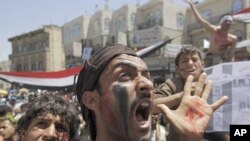A tense and sometimes bloody standoff continues between the president of Yemen and thousands of demonstrators trying to bring down his government after 32 years in power. The dispute reached a boiling point when supporters of the president shot and killed dozens of protesters last week, prompting key military and tribal leaders to join the opposition.
Divisions inside Yemen’s armed forces led President Ali Abdullah Saleh to warn his military chiefs that any attempt to stage a coup will bring on a civil war and split the country.
"Those who want to climb up to power through coups should know that this is out of the question. The homeland will not be stable; there will be a civil war, a bloody war," he said.
And in case the threat was not enough, President Saleh also offered to hold parliamentary elections later this year and leave office by January.
But despite the threats and offers, key military commanders and tribal leaders are lining up with government opponents who insist the president resign now.
Both the government and defecting army units have deployed armored vehicles in the streets of Sana’a, the capital. The government has declared a state of emergency.
American officials and analysts fear the situation is spiraling out of control.
"There is a significant danger of violence in Yemen because there is really no unity among the opposition or any obvious figure acceptable to the opposition, so that if the president goes, there is a very real question how will the country be governed and how Yemen’s many very difficult problems [can] be addressed," said David Newton, a former U.S. ambassador to Yemen.
Among those difficulties, Newton notes that Yemen’s 24 million people are among the poorest in the Middle East, and that the country is also dealing with separatist movements and an active al-Qaida terrorist presence.
Even so, Newton says there is a chance at success if the various opposition groups can unite and form an interim government.
Such a government, he says, might then be able to reach out to secessionists in the south and the Shi'ite Houthi rebels in the north of Yemen.
It all depends, he says, on whether Yemen’s army maintains discipline and serves as a force of stability during any transition phase.
Ibrahim Karawan, a professor at Utah University and former director of its Middle East Center, says the army role will depend on how President Saleh handles the next few days or weeks. "The army thus far did not want to intervene and some of its leaders began to split and began to distance themselves from the regime of Ali Abdullah Saleh and that will open the door towards other forms of disentanglement with the regime and distancing the military leadership from the regime," he said.
For the United States, the departure of President Saleh would mean the loss of a key ally against the al-Qaida in the Arabian Peninsula terrorist group that has been operating openly in Yemen.
Karawan notes, however, that it should be possible for Washington to work out similar cooperation on terrorism with a new government in Yemen. "The military will be the force that will call for continued cooperation with the U.S. and would call on the U.S. to maintain its military support for Yemen, and America will try to play on that link between the regime and the American interest itself," he said.
Most U.S. experts on Yemen say that whatever kind of regime takes power in Yemen, it could limit the threat of al-Qaida by maintaining ties with the United States and addressing the country’s social and economic problems.
Sharp Divisions Cloud Yemen's Political Future




